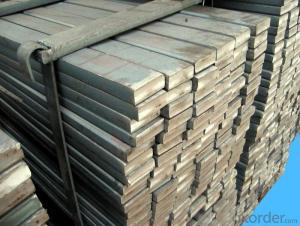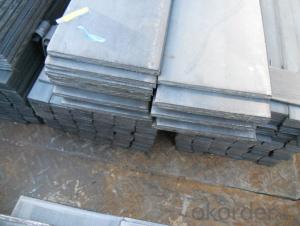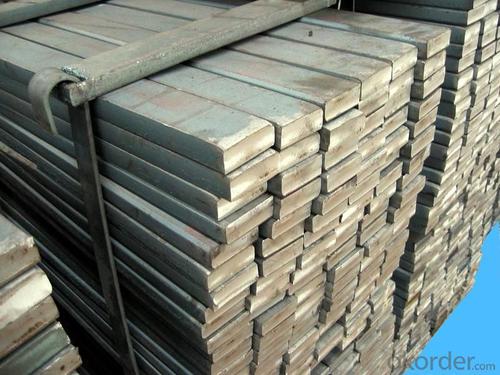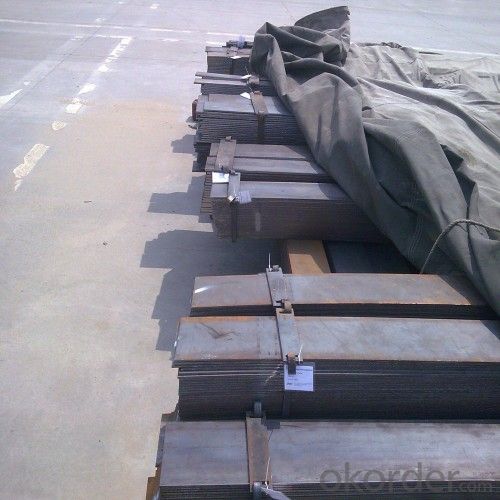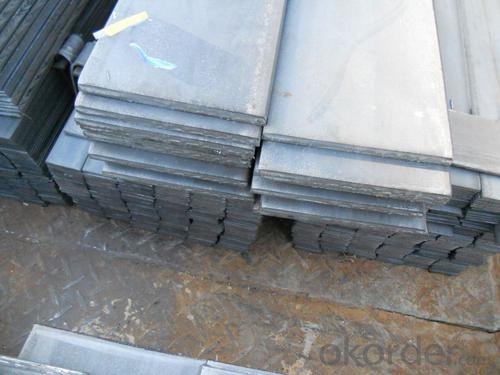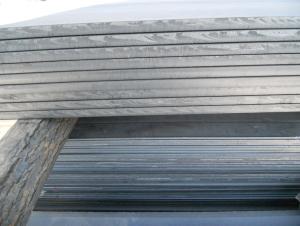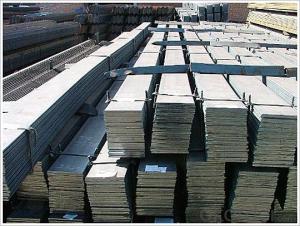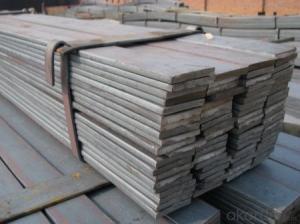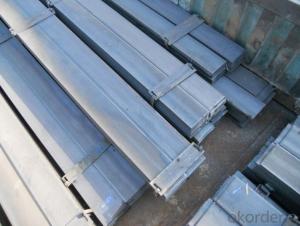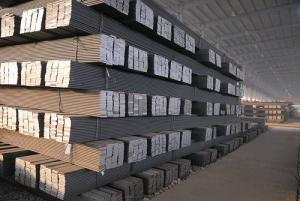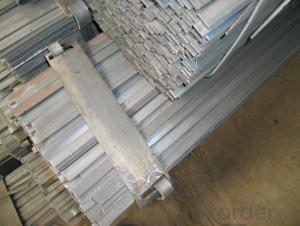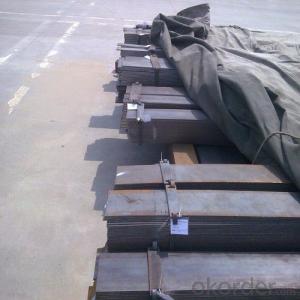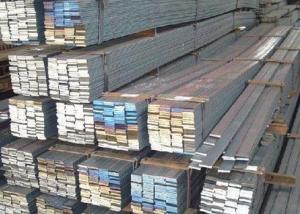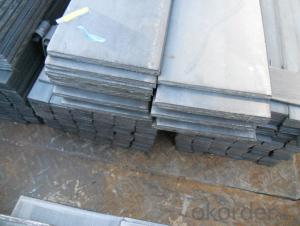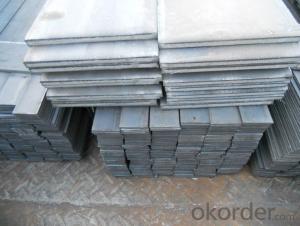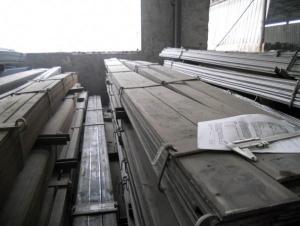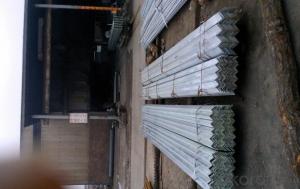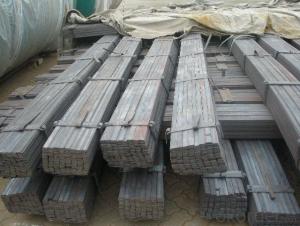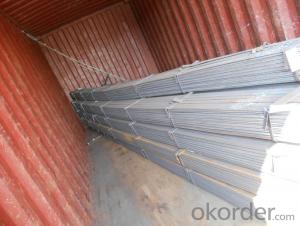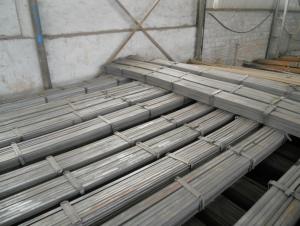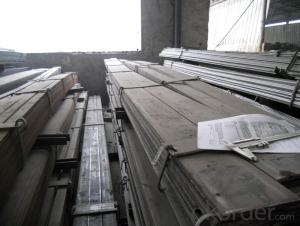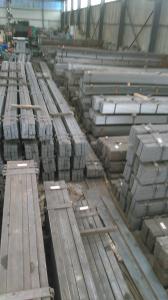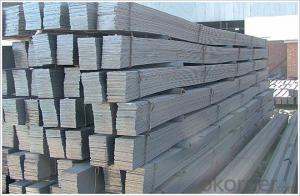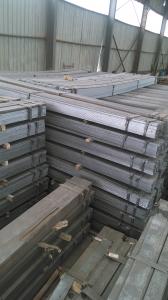Hot Rolled Flat Bars with Material Good Price
- Loading Port:
- Tianjin
- Payment Terms:
- TT OR LC
- Min Order Qty:
- 25 m.t
- Supply Capability:
- 10000 m.t/month
OKorder Service Pledge
OKorder Financial Service
You Might Also Like
Product Description:
OKorder is offering high quality Flat Bar at great prices with worldwide shipping. Our supplier is a world-class manufacturer of steel, with our products utilized the world over. OKorder annually supplies products to European, North American and Asian markets. We provide quotations within 24 hours of receiving an inquiry and guarantee competitive prices.
Product Applications:
Flat Bars are ideal for structural applications and are widely used in the construction of buildings and bridges, and the manufacturing, petrochemical, and transportation industries.
Product Advantages:
OKorder's Flats Barare durable, strong, and resist corrosion.
Main Product Features:
· Premium quality
· Prompt delivery & seaworthy packing (30 days after receiving deposit)
· Corrosion resistance
· Can be recycled and reused
· Mill test certification
· Professional Service
· Competitive pricing
Product Specifications:
Manufacture: Hot Rolled
Grade: Q195 – 235
Certificates: ISO, SGS, BV, CIQ
Length: 6m – 12m, as per customer request
Packaging: Export packing, nude packing, bundled
Chemical composition of Q235
Alloy No | Grade | Element(%) | ||||
C
| Mn
| S
| P
| Si
| ||
Q235
|
B
|
0.12—0.20 |
0.3—0.7 |
≤0.045 |
≤0.045
|
≤0.3
|
Physical properties of Q235
Alloy No | Grade | Yielding strength point(Mpa) | Tensile strength (Mpa) | Elongation after fracture(%) | ||||||
Thickness (mm) | Thickness (mm) | |||||||||
≤16 | >16--40 | >40--60 | >60--100 | ≤16 | >16--40 | >40--60 | >60--100 | |||
≥ | ≥ | |||||||||
Q235 |
B |
235 |
225 |
215 |
205 |
375--500 |
26 |
25 |
24 |
23 |
FAQ:
Q1: Why buy Materials & Equipment from OKorder.com?
A1: All products offered byOKorder.com are carefully selected from China's most reliable manufacturing enterprises. Through its ISO certifications, OKorder.com adheres to the highest standards and a commitment to supply chain safety and customer satisfaction.
Q2: How do we guarantee the quality of our products?
A2: We have established an advanced quality management system which conducts strict quality tests at every step, from raw materials to the final product. At the same time, we provide extensive follow-up service assurances as required.
Q3: How soon can we receive the product after purchase?
A3: Within three days of placing an order, we will begin production. The specific shipping date is dependent upon international and government factors, but is typically 7 to 10 workdays.
Images:
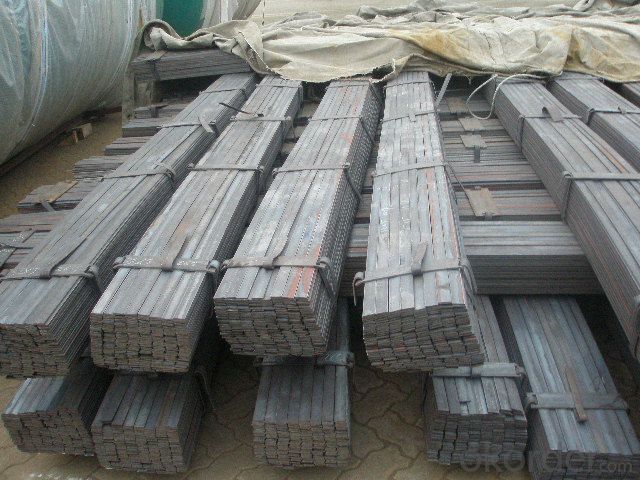
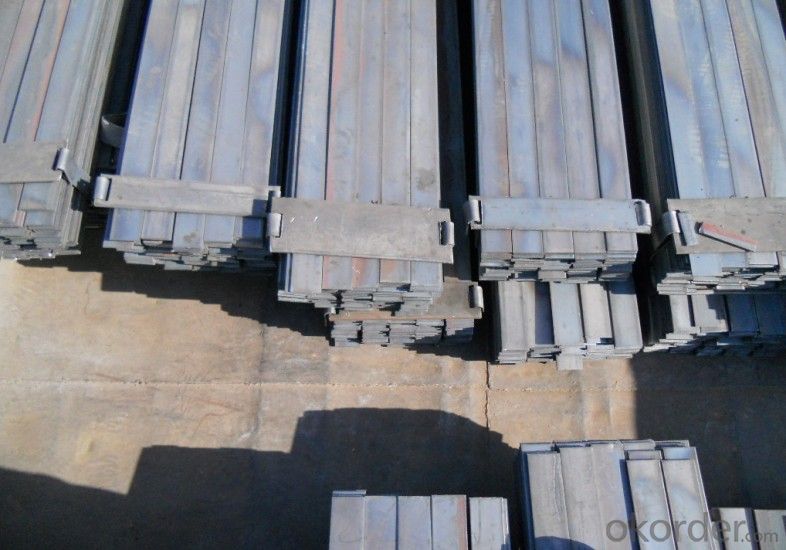
- Q: Difference between cold drawn flat steel and flat steel
- Cold drawn flat steel: steel, smooth surface,Flat steel: steel is relatively soft, flatness, no cold drawn flat steel
- Q: Can steel flat bars be used for manufacturing architectural facades or cladding?
- Yes, steel flat bars can be used for manufacturing architectural facades or cladding. They offer strength, durability, and a sleek appearance, making them suitable for such applications. Additionally, steel flat bars can be easily fabricated and installed, making them a popular choice in architectural design.
- Q: How do you prevent corrosion on steel flat bars in humid environments?
- One effective way to prevent corrosion on steel flat bars in humid environments is by applying a protective coating, such as paint or a corrosion-resistant barrier. This coating acts as a barrier, preventing moisture and oxygen from coming into direct contact with the steel surface. Additionally, regular cleaning and drying of the flat bars can help remove any accumulated moisture, reducing the likelihood of corrosion.
- Q: How do you protect steel flat bars from chemical corrosion?
- There are several effective methods that can be utilized to safeguard steel flat bars from chemical corrosion. 1. Coating: To prevent chemical corrosion, it is common practice to apply a protective coating. There are numerous coating options available, including paint, epoxy, enamel, and polyurethane. These coatings act as a barrier between the steel surface and corrosive chemicals, thus reducing the risk of direct contact and subsequent corrosion. It is crucial to select a coating specifically designed for chemical resistance and ensure proper application for maximum effectiveness. 2. Galvanization: Another method to protect steel flat bars from chemical corrosion is through galvanization. This process involves applying a layer of zinc to the surface, creating a protective barrier against corrosive substances. Hot-dip galvanization is a widely used technique where the steel is immersed in molten zinc, resulting in a durable and thick coating. Galvanized steel flat bars exhibit high resistance to chemical corrosion and offer long-lasting protection. 3. Stainless steel: Incorporating stainless steel flat bars with a high chromium and nickel content can significantly enhance their resistance to chemical corrosion. The inclusion of these elements forms a passive layer on the surface, acting as a protective barrier against corrosive chemicals. Stainless steel is particularly suitable for applications where exposure to aggressive chemicals is anticipated. 4. Proper storage and handling: Proper storage and handling practices are crucial in safeguarding steel flat bars from chemical corrosion. Storing them in a dry and well-ventilated area, away from corrosive substances, can prevent direct exposure. Additionally, using protective covers or wrapping the bars in moisture-resistant materials can provide an additional layer of defense. Regular inspection and maintenance are also essential to promptly identify any signs of corrosion. If any damage or deterioration is detected, timely repairs or replacements should be carried out to maintain the integrity and longevity of the steel flat bars.
- Q: Can steel flat bars be used for making mining industry equipment?
- Yes, steel flat bars can be used for making mining industry equipment. Steel is a durable and strong material that is commonly used in the mining industry due to its high tensile strength and resistance to wear and tear. Steel flat bars can be fabricated and used for various applications in the mining industry, such as manufacturing conveyor systems, structural supports, and equipment frames.
- Q: Can steel flat bars be used in the construction of bridges?
- Yes, steel flat bars can be used in the construction of bridges. Steel flat bars are commonly used in bridge construction as they provide strength, durability, and stability. They are often utilized in the fabrication of bridge components such as beams, trusses, and supports. Additionally, steel flat bars can be easily welded, making them versatile and suitable for various bridge designs and construction requirements.
- Q: What is the maximum load that steel flat bars can support?
- The maximum load that steel flat bars can support depends on various factors such as the dimensions of the bar, the type and grade of steel used, and the method of support. Therefore, it is difficult to provide a specific answer without more details.
- Q: How do steel flat bars compare to rubber flat bars?
- Steel flat bars and rubber flat bars possess distinct characteristics and are suited for diverse applications. Steel flat bars, crafted from top-notch steel, are renowned for their robustness and resilience. They exhibit exceptional load-bearing capabilities and can endure substantial weight and pressure. Industries like construction, manufacturing, and engineering rely on steel flat bars due to their indispensable strength and stability. Moreover, they are corrosion-resistant, rendering them apt for outdoor usage. In contrast, rubber flat bars consist of synthetic rubber compounds and are distinguished by their flexibility and shock-absorbing attributes. They find their primary utility in contexts necessitating vibration attenuation, impact resistance, or cushioning. Sectors such as automotive, machinery, and transportation extensively employ rubber flat bars to absorb impacts, minimize noise, and mitigate vibrations. Regarding cost, steel flat bars generally incur higher expenses owing to the elevated production costs of steel. However, their superior durability and prolonged lifespan make them a fiscally prudent choice in the long run. Ultimately, the selection between steel flat bars and rubber flat bars hinges upon the specific requirements of the application. If strength, durability, and load-bearing capacity take precedence, steel flat bars emerge as the preferred option. Conversely, if flexibility, shock absorption, and vibration reduction assume paramount importance, rubber flat bars prove to be the more suitable alternative.
- Q: Are steel flat bars suitable for earthquake-prone areas?
- Yes, steel flat bars are suitable for earthquake-prone areas. Steel is a strong and durable material that can withstand seismic forces better than other materials. Flat bars provide structural stability and can be used in various applications such as reinforcing structures, bracing walls, or constructing seismic-resistant frames.
- Q: How do steel flat bars compare to titanium flat bars?
- Steel flat bars are generally stronger and more durable compared to titanium flat bars. Steel has a higher tensile strength, making it suitable for heavy-duty applications and structural support. Titanium, on the other hand, is lighter and more corrosion-resistant, making it ideal for industries like aerospace, where weight reduction and high resistance to corrosion are crucial. Ultimately, the choice between steel and titanium flat bars depends on the specific requirements of the project or application.
Send your message to us
Hot Rolled Flat Bars with Material Good Price
- Loading Port:
- Tianjin
- Payment Terms:
- TT OR LC
- Min Order Qty:
- 25 m.t
- Supply Capability:
- 10000 m.t/month
OKorder Service Pledge
OKorder Financial Service
Similar products
Hot products
Hot Searches
Related keywords
